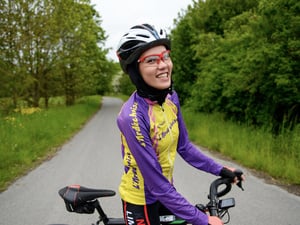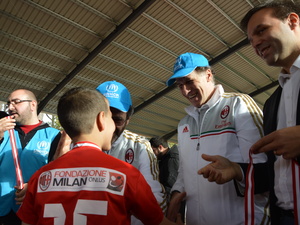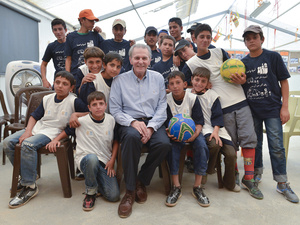Refugee athlete shares message of peace in South Korea
Refugee athlete shares message of peace in South Korea

Pur Biel in South Korea, where he attended the International Olympic Committee's Truce Mural ceremony.
SEOUL, South Korea – UNHCR High Profile Supporter and refugee athlete Yiech Pur Biel carried a special message of peace as he arrived on the divided Korean Peninsula ahead the 2018 Winter Olympics.
"Peace is the fundamental of everything that a state can do," Pur told the audience during a talk in Seoul on the UN's Sustainable Development Goals (SDGs). "A person needs many things – shelter, food, water, education and medical services – to survive, but what do they all mean without peace? As a refugee who fled from a country in conflict, I know and have experienced for myself how important peace is."
Pur, a track and field athlete originally from Nasir, South Sudan, was invited to South Korea to join the International Olympic Committee's Truce Mural ceremony for the PyeongChang Winter Olympics. He was also one of the speakers of the Olympic SDGs Talk Concert in Seoul, organized by seven UN agencies in the country.
"Every step towards peace is important."
Pur said he was greatly moved that North and South Korea would be marching under a united flag for the Olympics, which are set to begin on 9 February.
"It is really great that the two sides agreed on it,” he said. “Every step towards peace is important, isn't it?"
The star athlete was forced to flee war in South Sudan in 2005 at the age of 10, leaving his parents and arriving alone to Kakuma refugee camp in northern Kenya. There are currently more than 2.5 million South Sudanese refugees in countries including Kenya, Uganda and Ethiopia.
In his speech, Pur recalled the emotional moment he was able to reunite with his mother via phone after being selected to compete for the first Refugee Olympic Team in the 800m event at the Rio Summer Olympics in Brazil.
"My life has changed since then," he said. "After I became a member of the Refugee Team, I could pursue further education in college and I was given the chance to show the world that as a refugee you can still do something."
For Pur, being a refugee is just a label. He knows that it is up to him to achieve his goals – to become a professional runner and to pursue his studies.
"Refugee is only a name. It is important what you carry inside it," he said. "To young refugees aspiring to become athletes, I would like to say that it takes time and training to become an athlete. Be diligent and have faith, and you will still be able to achieve something in life, although you are a refugee and temporarily do not have a country."












